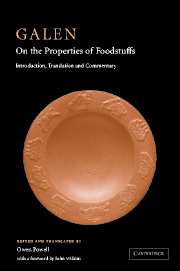Galen's medical and scientific terminology
Published online by Cambridge University Press: 22 September 2009
Summary
Translation of ancient Greek ‘scientific’ texts presents a number of problems and reliance upon the standard dictionaries is risky. These depend upon the accuracy of sources of information that may have been dubious to start with or, more likely, may have been superseded by advances in knowledge or changes in terminology or taxonomy.
In On the Properties of Foodstuffs the problems relate both to the medical and to the non-medical content. For my part, however, the medical content has been the more difficult to interpret, and this despite my professional life having been spent in medicine. Or perhaps because of it!
Questions of interpretation aside, there is the prior problem of translating terminology, and here there are some difficulties that apply specifically to the translation of ancient medical texts. A good deal has been written on this subject by philologists such as Chantraine as well as by a number of other classicists, of whom Lloyd has made the most valuable contribution in English, dealing especially with anatomy. The translator of Galen's On the Use of the Parts has also given an account of the problems she faced. Among the identified causes perhaps the most important is the Greek lack of an agreed, consistent, stable and unambiguous scientific language. In our own time we have been able to use Greek or Latin (sometimes Arabic) to provide names, or elements for word-building, but the Greeks had nothing (or did not think to useing anything) of the sort.
- Type
- Chapter
- Information
- Galen: On the Properties of Foodstuffs , pp. 20 - 28Publisher: Cambridge University PressPrint publication year: 2003



